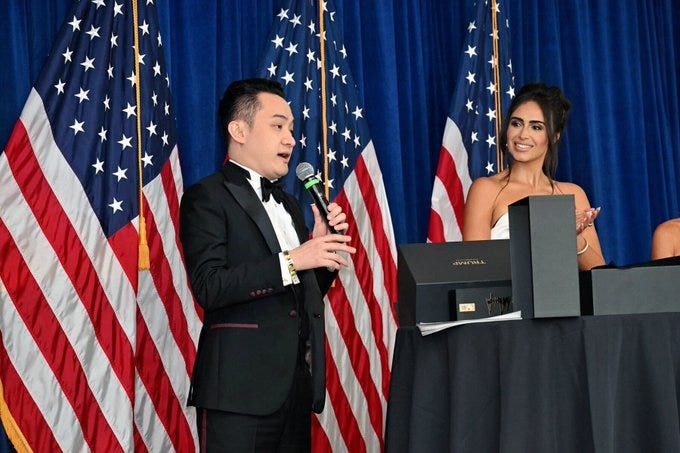From Beijing to Mar-a-Lago: The Reinvention of Justin Sun
Justin Sun built his crypto empire by blending narrative, ambition, and perfect timing.
When Chinese crypto billionaire Justin Sun announced in June 2025 that TRON would go public in the U.S. via a reverse merger with Nasdaq-listed SRM Entertainment, many observers were surprised—not by the deal itself, but by how far Sun had come. Just two years prior, he was facing civil fraud charges from the U.S. Securities and Exchange Commission (SEC). Now, with the merger valued at $210 million and backed by a $100 million token deal, Sun is aligning himself with Trump-linked financial networks and formalizing TRON’s entry into the U.S. capital markets. The news sent SRM shares soaring nearly 700% in anticipation.
But this moment is just the latest act in Sun’s long-running performance: one marked by reinvention, spectacle, and survival. His latest appearances—as the largest holder of a Trump meme coin and a guest at a Mar-a-Lago fundraiser dinner—aren’t random provocations. They mark a calculated turn: away from the shadow of regulatory scrutiny and toward a new identity as a power broker within America’s shifting political and financial order.
Rewriting the Script: From Regulatory Risk to Deal Maker
In February 2025, the SEC and Justin Sun jointly petitioned a U.S. federal court to pause the civil fraud case against him and three affiliated entities (Tron Foundation, BitTorrent Foundation, and Rainberry). The 60-day stay signaled active settlement talks. Originally filed in March 2023, the SEC’s complaint alleged that Sun had issued unregistered securities (TRX, BTT), engaged in over 600,000 wash trades, and failed to disclose celebrity promotion payments.
While the case has not been dismissed, the procedural pause marks a meaningful shift. Sun is no longer ducking regulators or denying the legitimacy of their claims. Instead, he’s negotiating—positioning himself not as a fugitive of U.S. law, but as a player within it.
Building a Public Persona: From Peking University to Penn
Born in 1990, Justin Sun crafted his career with the instincts of a political strategist. He gained entry to China’s prestigious Peking University not through top exam scores, but by excelling in a national essay competition that offered alternative admission pathways. On campus, he cultivated a reputation as a provocateur—running for student president, criticizing university bureaucracy, and claiming he was detained on election day. Rather than harming his reputation, these stunts increased his visibility. He exited early, transferring to the University of Pennsylvania to polish his resume with an Ivy League credential.
At Penn, Sun attended Wharton courses and immersed himself in Silicon Valley’s disruption culture. After a few failed attempts at landing finance jobs, he returned to China, betting on entrepreneurship over employment.
Finding Opportunity in the Crypto Boom
Sun entered the crypto world just as it was taking off in China. He became Ripple’s Greater China representative and in 2015 was admitted to the inaugural class of Alibaba founder Jack Ma’s exclusive Hupan University. The “Jack Ma protégé” label became central to Sun’s public identity, reportedly at his insistence in media coverage.
His breakout came in 2017, during the ICO boom, with the launch of TRON. Internally, Sun reportedly told employees that raising $200 million would be mediocre. TRON ultimately raised around $70 million—a figure Sun nonetheless spun into a PR win. The day after TRON’s ICO closed, China issued a nationwide ban on such offerings. Sun, conveniently abroad in Korea at the time, refused to refund investors, leaving his domestic team scrambling. He soon relocated to San Francisco.
By 2018, Chinese media outlet Caixin reported that Sun was under travel restrictions due to allegations of illegal fundraising. It remains unclear how he left the country, but by the end of that year, he had resettled overseas.

Mastering the Media Cycle
While Sun is not widely recognized for technical innovation, he is a master of narrative construction. In 2019, he paid $4.56 million to win a charity lunch with Warren Buffett, only to cancel the meeting last-minute due to a reported case of kidney stones. The postponement triggered a wave of speculation and market activity. The lunch eventually occurred, with Sun gifting Buffett a phone preloaded with TRON apps. Buffett remained unimpressed and later ended the tradition altogether.
Sun has consistently used media—both social and traditional—to build a mythology. From announcing a $100 million film project about the JD.com founder’s sexual assault case in Minnesota, to tweeting about regulatory changes in real time, his style blends provocation, spectacle, and strategic messaging. In 2023, a reporter from 36Kr flew to Singapore for a rare interview, only for Sun to ghost the meeting. Former associates describe him as opportunistic and relentless. “He’d survive to the end in a disaster movie,” one quipped.
The Next Act
Now, in 2025, Justin Sun is not hiding. He’s back in the headlines, publicly navigating SEC negotiations while dining at Trump’s table. The reverse merger with SRM not only gives TRON a U.S. listing, but also embeds the project in a network of investors and financiers aligned with the Trump orbit. For Sun, it’s a strategic hedge: against regulatory risk, reputational damage, and geopolitical instability.
His story is no longer just about blockchain, or even business. It’s about the shape-shifting potential of global capital, the elasticity of legal enforcement, and the enduring power of personal narrative. For Justin Sun, controversy isn’t a threat—it’s fuel. And in this latest chapter, he’s once again proving that reinvention is his most valuable asset.





